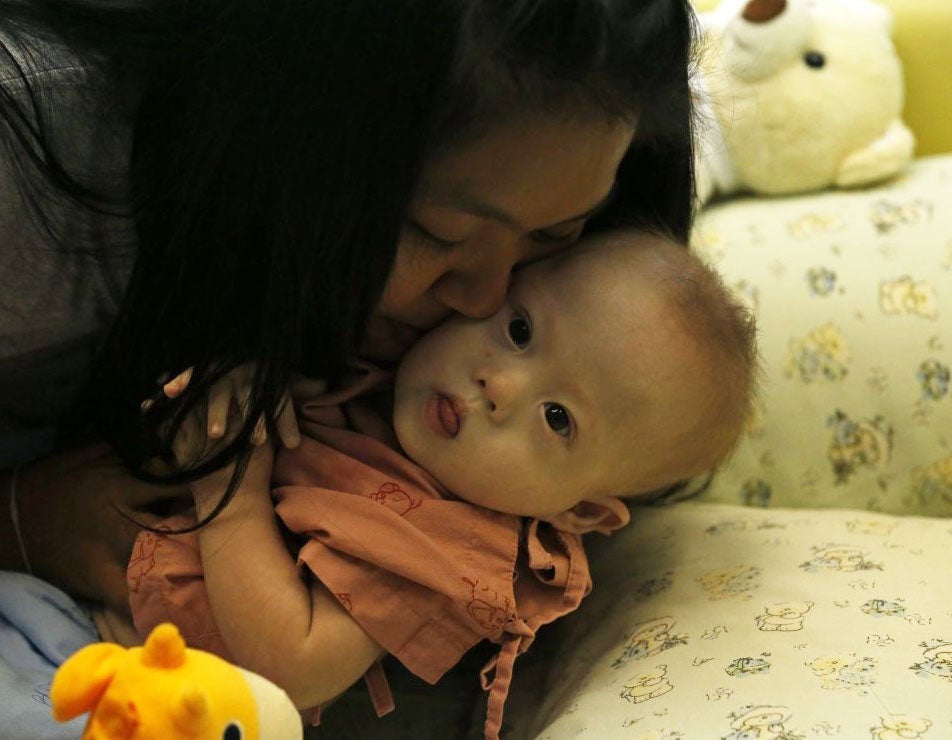I used to think surrogacy was immoral – but then I watched another women give birth to my child
It is extreme, but my daughter has brought love and happiness beyond what you can imagine

The 'Gammy’ case - that of the Australian couple who had a child born through surrogacy, but 'rejected' its Down’s Syndrome twin - has led to much controversy in the media, characterising the surrogacy process as exploitative and immoral, that it's 'shopping for babies'.
Ten years ago, I would have agreed. Back then, I thought that surrogacy was extreme and probably immoral. Now, having watched another woman give birth to my baby, I still think that surrogacy is extreme but I don’t now think that it is always immoral.
Then again, if you had told me 10 years ago that I would have a surrogate baby, I would never have believed you.
So why the change? Answer - two extraordinary American women who I got to know well. One was our surrogate mother, the other was our egg donor. When our surrogacy agency first put me in e-mail contact with these women, I kept asking them again and again – do you really want to do this for us? Are you sure?
Both are intelligent woman, neither are poor, both assured me that they really did want to help. I felt uncertain, guilty, terrified. Surely this couldn’t be right? But my husband and I were desperate. We had an older son but we had lost a daughter to a stillbirth. Four miscarriages had followed, then failed IVF. Our attempts to adopt had become mired in endless bureaucracy. Surrogacy was our last chance.
Did we pay our surrogate Mum and our egg donor? Yes, and I’m glad that we did. In the UK, the belief is that paying for surrogacy will lead to exploitation. To me, it seems that failing to offer proper compensation would be exploitation. Were these women paid a huge amount of money? No. Under surrogacy laws in Minnesota no-one can be paid a sum which might persuade them to do something which they otherwise would not have done.
And so all the arrangements were made, all the legal documents were signed. The nine months of the pregnancy were agonizing. I worried about everything all day – but strangely I never worried about our baby. I just knew that our surrogate Mum would look after her. But still, even as we left for America to fetch her home, I was wracked by doubt and guilt. Surely it couldn’t all work out?
But it did. We had 10 fantastic days together with our surrogate Mum, days full of fun and love, days we’ll remember forever. During that time she and I talked endlessly. ‘Tell me, really, why did you want to do this?’ I asked. She said, ‘On their death bed lots of people ask themselves what they really contributed. I won’t have to ask myself that question.’
Inevitably, our discussions eventually turned to that most difficult of issues. ‘Does part of you want to keep the baby?’ Her answer was unequivocal. ‘No. She’s not genetically my baby and I knew from the beginning that I wouldn’t keep her. She was always for you. I just want you all to be very happy.’
She got what she wanted. And we are happy. Six months after getting back to the UK we went to the High Court and got a Parental Order which means that our daughter is now legally ours and has a UK birth certificate with my name on it. The judge commented that we had clearly gone to great trouble to behave fairly.
Three years on we are still in touch with our egg donor and our surrogate. All of us love my daughter and feel incredibly proud of the different roles we played in creating her. Our egg donor has gone on to donate for other couples. Our surrogate Mum knows that she gave us a gift the value of which is beyond measure. She has also gone on to be a surrogate for another couple.
Why was our surrogacy arrangement so harmonious? Partly because our surrogate was American, so there was no vast inequality between her and us. Also we were all protected by a clear legal framework so that we knew from the beginning how everything would work. We also had the assistance of a highly professional Agency who select surrogates with great care.
It is for these reasons that 99.9 per cent of surrogacies in America work well. But all these success stories are never told. Only the bad new stories finish up in the media. I asked some of the surrogate mothers I’m in contact with why they don’t talk more openly about what they do? They all said the same. “It’s never a good idea to talk to the press. You’ll just be criticized and represented as heartless and money motivated.”
Isn’t it a tragedy that these women, who generosity should be widely celebrated, feel so embattled? It is partly in order to right that wrong that I decided to write a memoir about my experiences. The book I’ve written is certainly not a marketing document for surrogacy. I remain acutely aware of all the ways in which the process can go wrong. But I also want people to know that sometimes surrogacy brings love and happiness beyond what you can imagine.
Alice Jolly is an author, playwrite and teaches creative writing at Oxford University. She is crowd-funding her own memoir of infertility and surrogacy with the publisher Unbound. 50 per cent of the proceeds of the book will be donated to SANDS (The Stillbirth and Neonatal Death Foundation).
Join our commenting forum
Join thought-provoking conversations, follow other Independent readers and see their replies
Comments
Bookmark popover
Removed from bookmarks